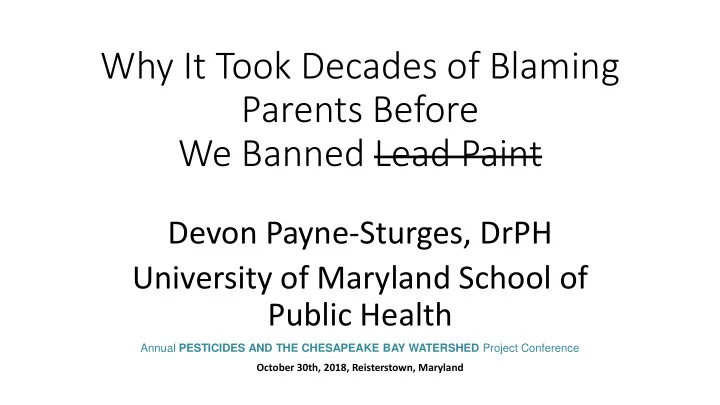

Why It Took Decades of Blaming Parents Before We Banned Lead Paint Devon Payne-Sturges, DrPH University of Maryland School of Public Health Annual PESTICIDES AND THE CHESAPEAKE BAY WATERSHED Project Conference October 30th, 2018, Reisterstown, Maryland
• Policy for science • Science for policy 3
Three Big Ideas about Science and Public Policy • Connect the dots/policy decisions are part of a larger system • Science is subjective/knowledge is social construct • Policy is story telling/ narrative coherence
Google Images
Complex Adaptive Systems • …is a system in which a perfect understanding of the individual parts does not automatically convey a perfect understanding of the whole system's behavior. • Occur in many fields — social, physical, and natural sciences — but share general properties: • Composed of heterogeneous , adaptive actors • Multi-level , with important feedback effects • Dynamic , with nonlinearity and strong interdependence between factors • Non-trivial spatial structures • Emergence, Tipping, Path-dependence
Problem: Public policy decisions are part of a larger system
Not all water is created equal
Impacts in Flint • Public Health Effects • Lead poisoning, cases of Legionnaires disease, increase in stress and anxiety • Economic Effects • $15 million to reconnect to Detroit Water/GLWA, $30 million reimbursement to Flint residents for purchasing water, $ millions to replace lead pipes.. • Broken trust • Even after federal officials label the water as safe and end subsidies, many residents do not trust the water.
Problem: Public expectation that science provides objective proof for decision making
Clarifying the Distinctions Scientific Research Science-Policy Assessment • “Process by which scientific • “Process of discovering new and technological evidence knowledge through is marshaled for the research.” purpose of predicting, • “Inquiry aimed at projecting, or otherwise understanding the physical, characterizing the biological, social and consequences of mathematical world around alternative courses of us.” action.” 11 Herrick 2004
Science Policy Choices: Are they “objective” or “subjective” Aldrin/Dieldrin Dioxin • Cancer vs non-cancer • Tumors in 2 more animal species and existence of • high or low levels of cancer in humans exposure OR • Causation of cancer or • Identified by either animal “mere” promotion of cancers studies or human studies • Production of tumors in one animal species is assumed to be carcinogenic to humans 12
Knowledge is social construct • “ O bjectivity” is defined within our disciplines • “Scientists have epistemological affinities and chauvinisms, based on education and training, personal affiliations and loyalties” • Different experts weigh evidence differently Herrick 2004 and Oreskes 2004
“Epidemiology and toxicology studies suggest there is evidence for adverse health outcomes associated with chlorpyrifos exposures below levels that result in 10% RBC AChE inhibition (i.e. toxicity at lower doses).” Google images FIFRA Science Advisory Panel, 2016
Problem: If proof is not a precondition for policy action then what?
Narrative Coherence • “Science helps furnish and bound a solution space” • Context – institutional mission and mandate • Weight-of evidence model as the narrative framework • Strength of the policy product is a function of overall coherency, plausibility and “ compellingness ” of the narrative Herrick 2004
“All scientific work is incomplete – whether it be observational or experimental….That does not confer upon us a freedom to ignore the knowledge we already have or to postpone the action that appears to demand at a given time.” -Sir A. Branford Hill, 1965
Recommend
More recommend